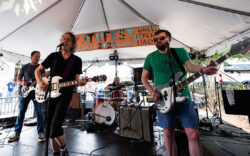For the second year in a row, Austin’s formidable and culture-shaping South By Southwest continued to show that while we may be done with COVID, it is clearly not done with us.
The big money, and a large amount of attention, surrounding the nine-day conference seemed to swirl around artificial intelligence, and there were fully 67 different conference events concentrated on AI, including panels, talks and book signings.
Film was still both a priority and highlight for SXSW, although the marketing efforts of specific studios and distributors felt more concentrated and specifically earmarked for individual projects rather than projects as such.
The music portion of the conference was shortened by a full day. Although official live performances did continue through Saturday, Mar. 16, there were no conference sessions that day. Further, there were a minimal amount of music participants in the Exhibition Hall (essentially a trade show) this year, and the ones that did catch my eye were all focused on music produced by generative AI. The one old-school exhibitioner I talked with was Pollstar, which has been the touring industry’s bible for over four decades. There may have been more, but I crawled every row of exhibitioners and didn’t find any.
The economic impact of 2020–2021, a loss Pollstar estimated at $30 billion in 2020 alone, is still reverberating strongly across the music industry even as the huge operators like Live Nation, Spotify and Apple Music are experiencing record profits. They also like to bet on sure things, whereas any traditional arts-focused organizations know well that nothing is assured. But it’s more than this, though. In the 2010s, SXSW had reached such dizzying heights of hype and attention that it became one of the world’s most do-not-miss events for both fans and the industry at large. In 2024, a huge amount of music-focused publications, smaller labels and associated ancillary services seemed to remember they had options and decided not to spend advertising and promotional dollars in Austin this year.
Final attendance numbers won’t be released until this fall but, based on last year’s numbers, it is estimated that SXSW drew approximately 300,000 people to Austin. To put this in perspective, that would be about 235% of the population of Athens, but most of the time it didn’t feel that way on the street at all. The only events that experienced non-stop demand and had folks waiting in line for hours were highly anticipated film premiers. For the most part, navigating music showcases was a breeze.
I’ve always found a lot of value in the SXSW conference itself, and this year was only slightly different. The talk between A&R veterans Paula Moore and Randy Jackson (you may know him from “American Idol” and the relaunched “Name That Tune”), both now of Greater Than Distribution, was informative and entertaining in a way I’d not anticipated. Jackson is charming and funny, but when he gets right down to it, he makes it clear that nothing in the world we call the music industry matters if it’s not backed up by good songs. It was refreshing, too, to hear each of them reiterate a commitment to artist development, which has basically disappeared in any formerly recognizable form.

Similar was the talk between John Oates of Hall & Oates (which he made clear is a colloquialism, as they’ve always insisted on being billed as Daryl Hall & John Oates) and Alex Heiche, founder of music financing firm Sound Royalties. Oates talked about how he’s been living in Nashville for a good while, and that particular environment caused him to kick up his game regarding not only songwriting, but playing itself. His music has experienced a renaissance of sorts due to lucrative licensing agreements as well. Oates shares concerns about the presence of artificial intelligence in music, too, and said, “Once the genie’s out of the bottle, that’s it, folks. It’s going to be a very interesting period of time… I’m interested in it, and I hate to be morbid, but I’m old enough to not have to worry about it, ‘cause I’m not gonna be around when it takes over.” Even so, he recognized the possibility of a coming flood of fakes, or even well-intentioned tributes, altering the landscape of what we know as catalog artists. “What’s to prevent AI from extrapolating from this incredible body of work and creating new David Bowie songs with David Bowie singing?” Oates asked. “Pretty much nothing can stop that unless there’s either legislation or people just don’t want it to happen.”
Even as attendees listened carefully and attentively to Oates, there was a lot of space left in the room. The major music keynote this year was hosted by The Black Keys, who were in attendance for the documentary This Is A Film About The Black Keys. I didn’t attend this one, though, and it may have been packed for all I know, but evidence from the less-than-full Oates and other sessions makes me doubt it.
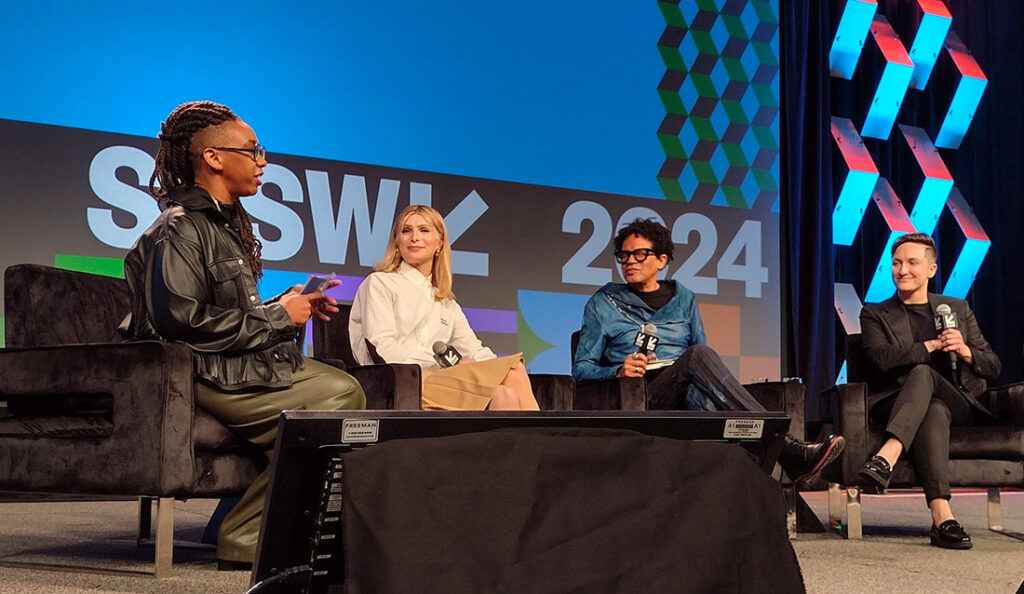
The wildest case of overestimating audience demand was the panel hosted by the Human Rights Campaign called “When Beer Goes Viral: The Role of Brands & Media in Fighting Hate.” It featured Human Rights Campaign president Kelly Robinson, deeply creative advertising executive Aaron Walton (CEO of Walton Isaacson), Jo Yurcaba (NBC Out), and trans influencer Dylan Mulvaney. Given that Mulvaney has been essentially ever-present for the past couple of years, it was not unreasonable to anticipate that this would draw a sizable crowd, and anticipation for it in the weeks leading up to it was strong. But then… nothing. And it’s not to do with anything that was said, as there were multiple cogent and relevant points made across the entire panel, my favorite observations and comments coming from Walton. To me, the rows upon rows of empty seats in Ballroom D (capacity 2,408) of the Austin Convention Center had more to do with public exhaustion, or outright disinterest, over Mulvaney as a personality and not any anti-LGBTQ+ sentiment. In some ways, I feel bad for Mulvaney, as I don’t believe they ever desired to be cast in the role of public spokesperson for the entire transgender community. Even a cursory glance across their presence on social media makes it clear: Dylan Mulvaney is in the Dylan Mulvaney business. Which is totally fine and not at all unlike most celebrities and pretty much all influencers. But clearly something was amiss here, and it wasn’t the strong numerical data presented by Walton, the support and advocacy of Robinson, nor the newsroom-education points made by Yurcaba. Literally the only thing I could surmise is that a swath of the public at large, or at least those inclined to attend events like SXSW and pride themselves on being forward-thinking and inclusive, are just tired of Mulvaney, whose appearance was promoted above the others. Everything has a cycle, and celebrities are no different.
Speaking of celebrities, I managed to catch panels with Mark Cuban, Sydney Sweeney, Tim Ferriss and Brooke Shields, but there’s already been more than enough coverage of these folks’ appearances elsewhere, so I’m not going to go into these any further.
That said, there was no controversy with regard to the above mentioned panel. Instead, that came from over 100 bands and musical artists dropping out from their official showcases due to SXSW’s being sponsored by the United States Army, as well as some defense contractors including RTX Corporation, formerly known as Raytheon. While I can imagine that these artists would be against such associations in a general sense, this particular action was undertaken with the express purpose of showing solidarity with Palestine. These included basically all acts from Ireland, including the buzzy Kneecap; Santa Cruz, CA hardcore band Scowl; and Fairfax, VA artist Okay Shalom. Trust me that this is a truncated list, and there were more who boycotted SXSW over these entanglements. Readers are free to agree or disagree with this action, but I can tell you this: Each of these artists has real skin in this game. Especially the overseas artists, many whose visas and travel expenses are paid for by their home governments and could, conceivably, find themselves ineligible for future support. The artists who had already made landfall in Austin before dropping out hurriedly put together alternate showcases, and many wound up performing in a non-official capacity.
However, the net effect on the conference itself and other attendees was basically zero. Outside of a few demonstrations—the one I checked out was woefully under-attended—no one on the street was talking about this at all. However, I did see multiple bands that delivered statements of solidarity from the stage even while still performing at their scheduled, official showcases. There did seem to be some virality to the boycott (i.e. we’re not doing it because so-and-so isn’t doing it, etc.) but, in any case, the artists involved experienced actual financial loss, and when someone is willing to put their money where their mouth is that’s a reason to pay attention.
All the above criticisms and observations aside, SXSW music was still a captivating and entirely worthwhile experience and one I’ve thoroughly enjoyed for many years. I’m not going to break this down day-by-day, so some items will appear out of order from their actual occurrence. Let’s start with the bad, though.
Houston rapper Dende experienced multiple technical problems getting started, and his performance at Palm Door was not only shortened, but suffered from a lack of momentum due to these delays. Ontario’s Pony Girl was listless and unentertaining in nearly every respect. Similarly, Vancouver’s Babe Corner exhibited none of the sharp, smart pop of its recordings and left my eyes drooping. Tokyo’s Ako(a子) seems to have a perfectly charming personality, but her faceless, bland pop couldn’t even be saved by her picking up an electric guitar toward the end of her set and trying to really rock it out.
Now, on to the good! The only film I saw all week was the premier of the first episode of “Thank You, Goodnight: The Bon Jovi Story.” Before the screening, the band arrived in a caravan of huge black SUVs, but then approached the huge crowd gathered outside the Paramount Theatre and signed autographs, took selfies, etc. It was easily the most populist moment I saw all week between some bona fide rock stars and their audience. After the screening, there was a brief Q&A among the band, director Gotham Chopra and—wait for it—his father Deepak Chopra. Of all the things I could never imagine seeing was the boys from Jersey onstage with Deepak Chopra. But it happened, and I was there for it.
The Waco Brothers played a dependably blistering set at Palm Door that even included a punchy cover of The Undertone’s “Teenage Kicks.” Austin’s own Tony 22 played an uplifting and joyous set at Stubb’s, and his blend of R&B and hip hop was only made sharper by the inclusion of his acoustic guitar playing which figures prominently in his recorded tunes. Austin’s Pedal Steel Noah, a 16-year-old pedal steel prodigy, was fantastic at Palm Door and also a total surprise in the best way: I went in not having a clue who he was and walked out a fan.
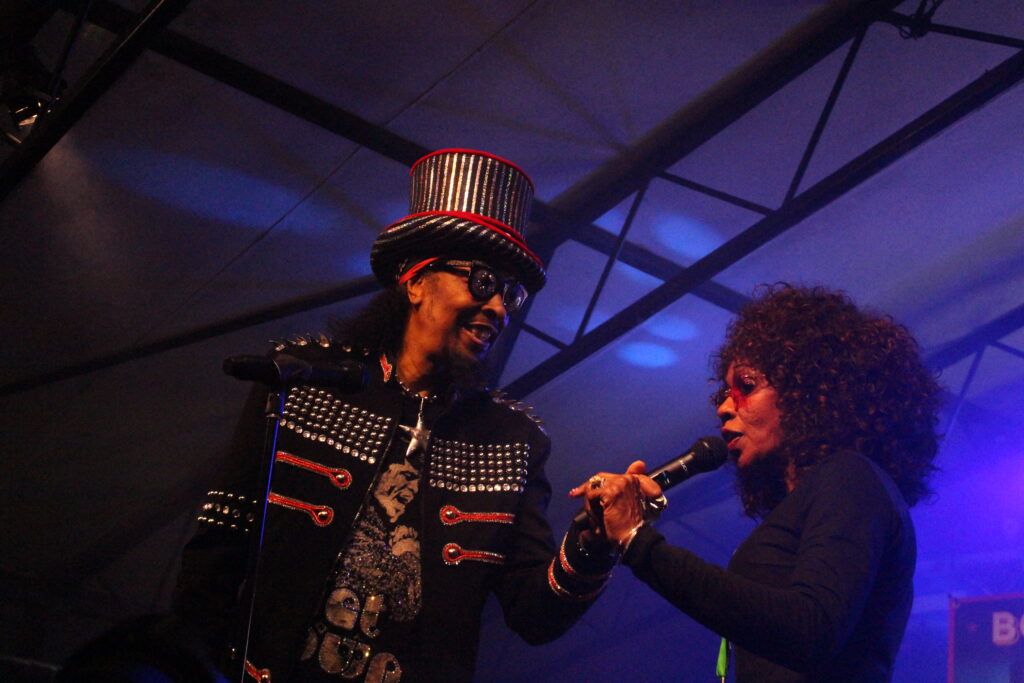
Music education charity The Give A Note Foundation and talent/marketing agency Artist for Artist joined hands for a damn solid showing at Mohawk. Hosted by Peppermint Patti Collins, who would eventually introduce her husband the legendary Bootsy Collins so he could come out, wave and say hey, this night was just pure joy. Although Collins didn’t perform, he was gregarious and friendly. The utterly legendary Slick Rick did play, though, and his set was tight, full of expected hits, and it was undeniably cool simply to be mere feet from him while he performed.
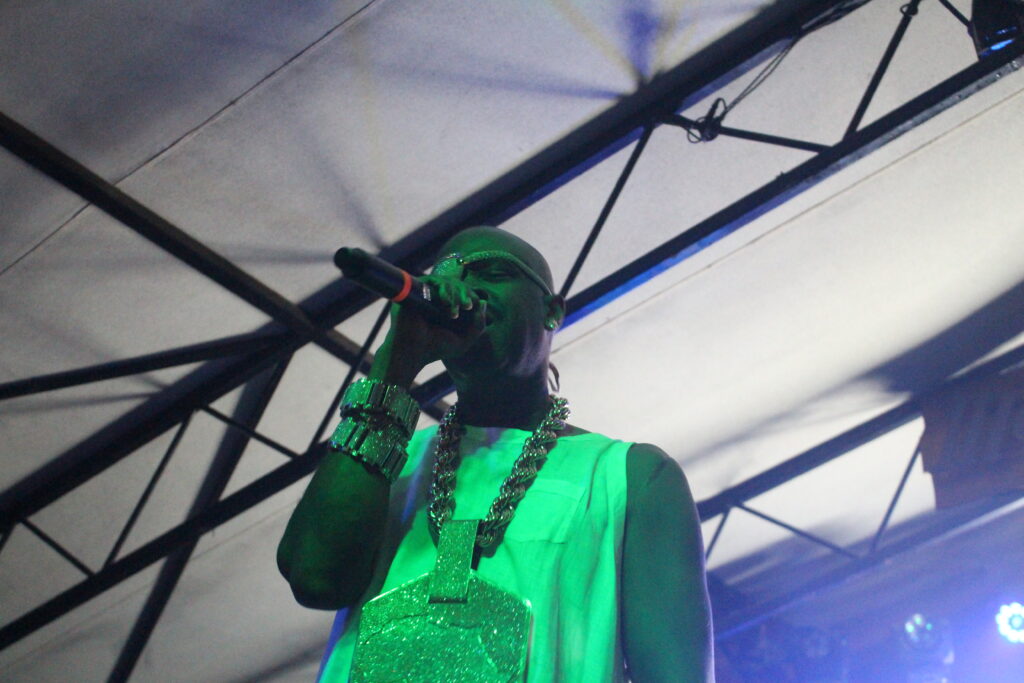
Athens had a particularly strong showing this year and, while I had to miss their actual performance, I overheard a woman speaking before the set from Pylon Reenactment Society at Cooper’s BBQ, and she said, “I just read a book on Athens music and these guys are, like, one of the founders of that whole scene!” Immediately preceding PRS’s set was the R&B icon Swamp Dogg. Now quickly approaching age 82, Dogg was still full of vinegar and smart comments even while competently plowing through a set of solid numbers backed by his crack team of players. At the New West Records showcase at Antone’s, The Howdies ushered in their particular brand of honky tonk to wonderful reception and, even after going on at 1 a.m., The Pink Stones maintained its reputation as one of Athens most reliable exports. Other specific highlights from New West that night were Luther Dickinson (ex-North Mississippi Allstars) and Nashville’s Emily Nenni.
One of the most wonderful surprises this year, and there were many, was seeing the U.S. debut of Stockholm’s Waterbaby. Set in the spectacular Central Presbyterian Church, I was unprepared for how much her music, sometimes so light it felt like it might float away, would touch me. With only a five-song EP under her belt, her set was not very long but every note of it was memorable and, indeed, special. Michigan’s Brie Stoner was effusively thankful from the stage at Cooper’s BBQ for fashion house Ralph Lauren placing her song “Hungry” in its Spring 2024 collection promotions. It used to be that the word chanteuse got thrown around a lot no matter its accuracy. Well, Stoner would be an accurate recipient of this tag. She moved only slightly slower onstage than Stevie Nicks in her heyday, and her theatrical, multi-layered and self-described “indie dream rock” was well-received and wonderfully played.
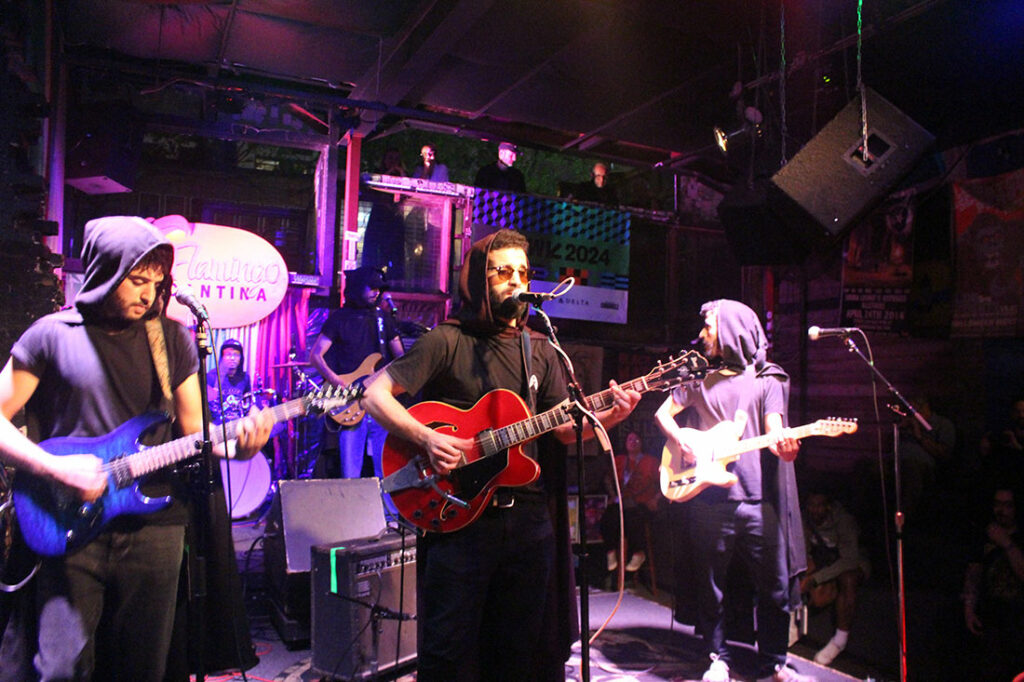
I was so psyched to see Morocco’s Meteor Airlines I could barely get myself to Flamingo Cantina with any semblance of calm. Mostly singing in their native North African Amazigh language, the group’s music was a distillation of American rock music filtered through their own musical traditions. On paper this might not sound like it would work, but it did and, as their set went on, increasingly so. Brooklyn’s Razor Braids has a phone book full of hooks, many of which are subtle and sneak up on you, but were delivered to uproarious applause. Also, the group’s set at Elysium was just chock full of rock and roll stage stances, head banging and other markers that said, “Hey, we’re here to rock you.”
Montreal’s Alix Fernz channeled the best of late 1970s punk à la very early Adam Ant, and his set at Swan Dive was propulsively enthusiastic. He did his best to stay relatively glum looking throughout, but there were definitely a few smiles from him as his audience hung on every note. In similar fashion, Atlanta’s hard punk/goth rockers Psychic Death laid waste to the Chess Club in the middle of the afternoon.
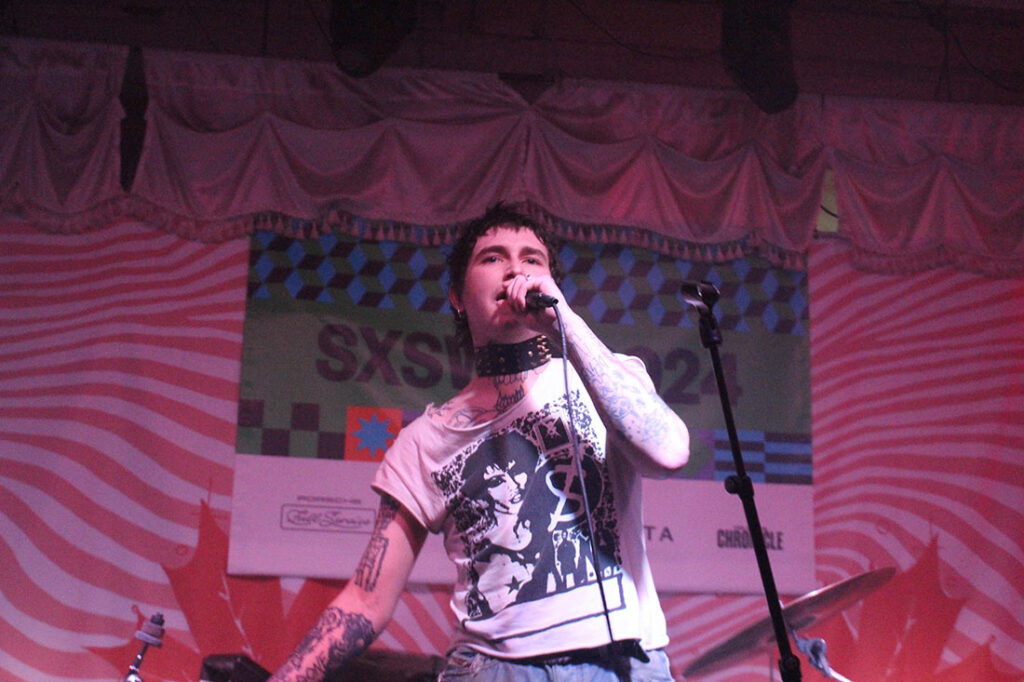
Los Angeles’ producer and composer Johnny Jewel, known for his soundtrack work, was enigmatic and darkly compelling especially as he performed his work which was featured in the “Twin Peaks” revival series complete with his screens displaying poignant clips. I briefly caught Atlanta super producer Jermaine Dupir and Miami’s rap legend Uncle Luke (AKA Luke Skyywalker from 2 Live Crew) when they hosted the release party for the Hulu documentary Freaknik: The Wildest Party Never Told, and then caught about half a set of Ying Yang Twins. Mostly for this I was corralled smack dab in the middle of a packed backyard at Stubb’s. I didn’t attempt to move closer because, if there’s one thing I’ve learned, it’s that you absolutely do not try to wiggle your way forward at any rap show in Austin, and presumably all of Texas. These audiences in particular have real territorial behavior, and I’ve seen fights break out over even the smallest of imagined slights.
It was cool seeing El Paso’s Defacto who had not played live in two decades. I never cared about them before, and have never been a fan of the group’s core of Omar Rodríguez-López and Cedric Bixler-Zaval’s other band The Mars Volta. But this show was special and occasionally mesmerizing in its intensity. And speaking of intense, Mogwai blew the figurative roof off the Moody Theatre when they followed. Their whole set was wave after churning wave of their swinging from their gentlest, most delicate tunes, to unbelievably loud and pummeling guitar thunder. It was positively majestic.
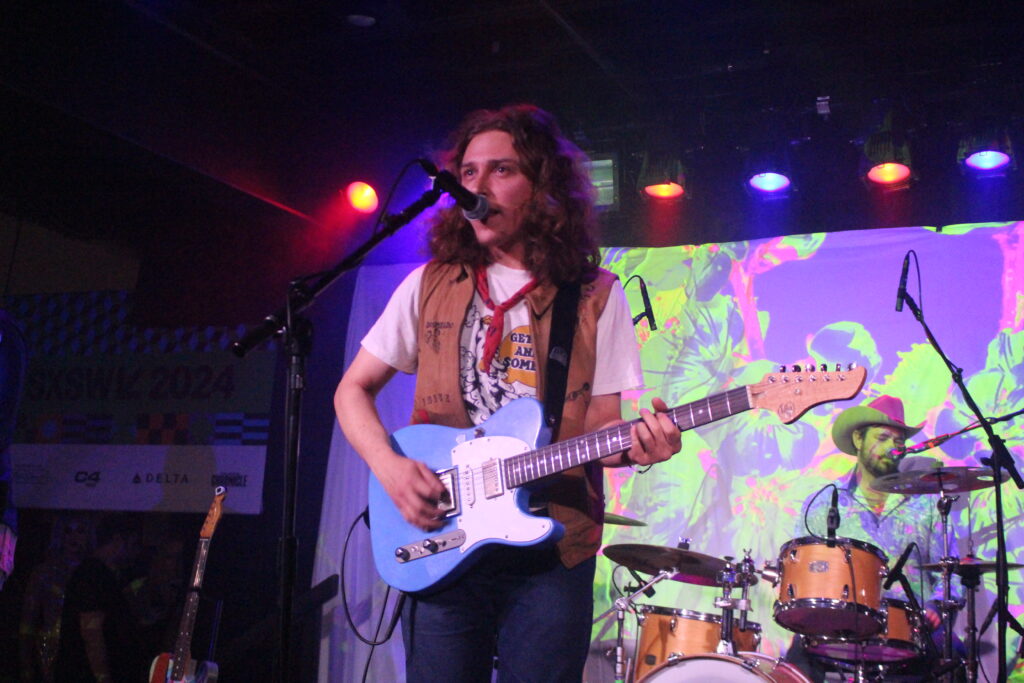
Summerland, CA’s Emi Grace was personable and enthusiastic at Palm Door, but her live set was markedly less techy than her recordings. Not so much that the tunes were completely unrecognizable, but close. Daniel Donato’s Cosmic Country was tipped to me and, being previously unfamiliar with Donato and his music, I left his show at Antone’s sold on his psychedelic country. And that’s actually a very weak and kind of obvious categorization and over-simplification of his patently American music, which was easily among the most noteworthy surprises I had this week.
I don’t know that I’ve ever seen, or at least not recently, an artist as thoroughly convinced of their own photogenicity than Fool’s Gold recording artist Shallowhalo. The pair, Allyson Camitta and Ezra Tenenbaum, didn’t stop moving and posing for even a moment during their entire set at Elysium. Frontwoman Camitta, especially. But this was part and parcel of their presentation and actually was a strong contributing factor to their overall delivery of the group’s tight, synth-based electropop.

Manchester, England’s Porij played multiple shows this week, but I only caught the one at Valhalla. At the time, they were enjoyable and I was glad to have caught them but afterward, when listening to the band’s recordings, their live show felt less than, and I found myself wishing it had sounded more like their dreamy records.
As a lifelong dance music fan I was completely thrilled to catch the powerhouse bill of Denver’s Kumarion, Prague’s Rido and N:Force at Kingdom. This showcase was presented by “the world’s leading drum and bass festival” Let It Roll. My sole regret was missing Houston’s Reaper who, as best I can tell, played out of the previously announced order and went onstage while I was busy seeing other acts elsewhere.
Italy’s Orion brought her Italo-disco best to the stage at Elysium complete with sharp visuals. So, too, did New York’s Vitesse X deliver her multi-instrumentalist electronic explorations to the same stage. This particular night, though, I was most pleased to catch up with former Athenian Vaperror (Jeff Cardinal) who now lives in Brooklyn. He has expanded his sound quite a bit since being a dedicated vaporwave artist, and now features guest vocals, some live bass guitar, and—at the very end of his set—utterly brutal heavy metal and associated sampled vocals which was quite jarring for those of us not expecting that.
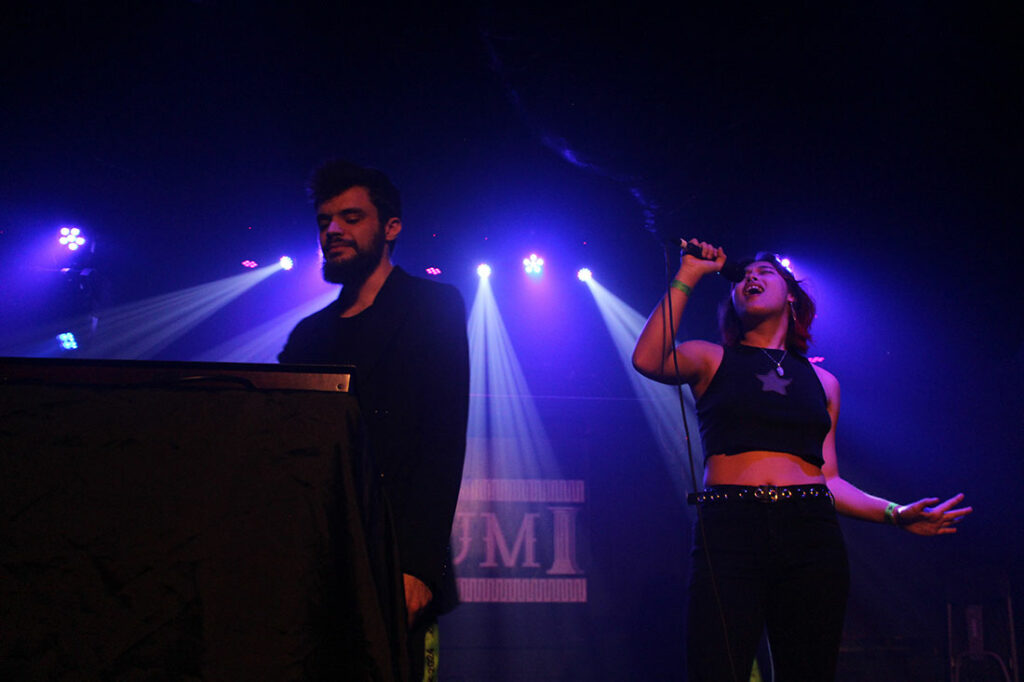
One major overarching thought that kept returning to me was, “This year actually feels like a music discovery festival and not simply a checklist of brands, hype, FOMO, etc.”
Which made me think of all the years of people bemoaning that SXSW had gotten away from its roots. It may not have happened the way it was desired, and it remains to be seen if music industry expenditures will return to their previous highs. But, for now, in my best and most honest estimation, SXSW music is closer to “the old days” than at any point in the past decade.
And as someone who spends a week in Austin each year searching the nooks, crannies, empty bars and clubs, reading every flier possible, and trying my absolute best to see acts I’ve never heard of and will likely never see again, I found myself quite pleased by the way the week shook out and thrilled to have uncovered for myself so much music I didn’t even know was out there.
Like what you just read? Support Flagpole by making a donation today. Every dollar you give helps fund our ongoing mission to provide Athens with quality, independent journalism.









